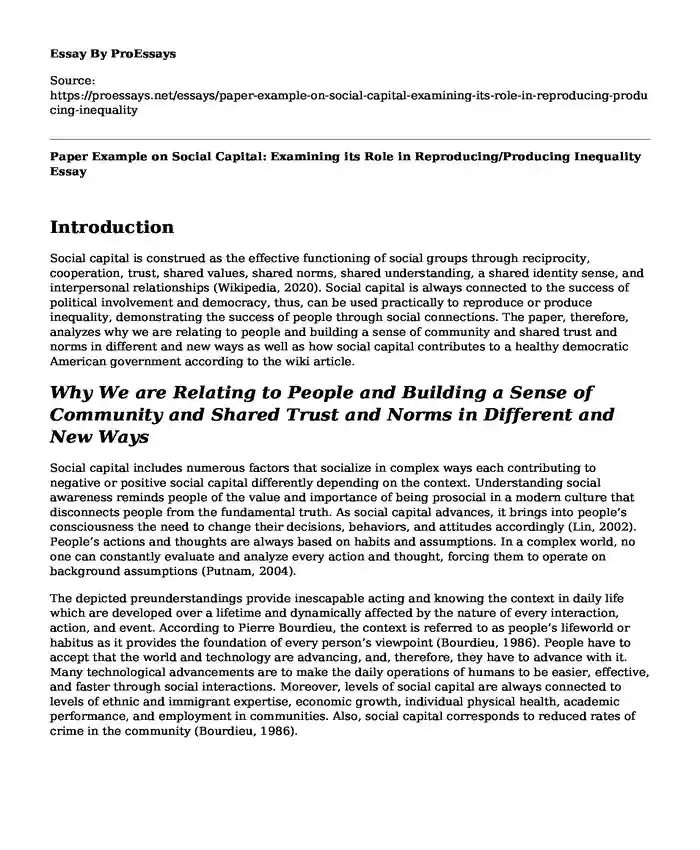Introduction
Social capital is construed as the effective functioning of social groups through reciprocity, cooperation, trust, shared values, shared norms, shared understanding, a shared identity sense, and interpersonal relationships (Wikipedia, 2020). Social capital is always connected to the success of political involvement and democracy, thus, can be used practically to reproduce or produce inequality, demonstrating the success of people through social connections. The paper, therefore, analyzes why we are relating to people and building a sense of community and shared trust and norms in different and new ways as well as how social capital contributes to a healthy democratic American government according to the wiki article.
Why We are Relating to People and Building a Sense of Community and Shared Trust and Norms in Different and New Ways
Social capital includes numerous factors that socialize in complex ways each contributing to negative or positive social capital differently depending on the context. Understanding social awareness reminds people of the value and importance of being prosocial in a modern culture that disconnects people from the fundamental truth. As social capital advances, it brings into people’s consciousness the need to change their decisions, behaviors, and attitudes accordingly (Lin, 2002). People’s actions and thoughts are always based on habits and assumptions. In a complex world, no one can constantly evaluate and analyze every action and thought, forcing them to operate on background assumptions (Putnam, 2004).
The depicted preunderstandings provide inescapable acting and knowing the context in daily life which are developed over a lifetime and dynamically affected by the nature of every interaction, action, and event. According to Pierre Bourdieu, the context is referred to as people’s lifeworld or habitus as it provides the foundation of every person’s viewpoint (Bourdieu, 1986). People have to accept that the world and technology are advancing, and, therefore, they have to advance with it. Many technological advancements are to make the daily operations of humans to be easier, effective, and faster through social interactions. Moreover, levels of social capital are always connected to levels of ethnic and immigrant expertise, economic growth, individual physical health, academic performance, and employment in communities. Also, social capital corresponds to reduced rates of crime in the community (Bourdieu, 1986).
How Social Capital Contributes to a Healthy Democratic American Government
According to the wiki article, it is through a civil society that people can establish and maintain relational social networks (Wikipedia, 2020). The voluntary associations build reciprocity, trust, and connected people with each other via loosely structured informal associations and consolidate society through altruism with no obligation. The depicted range of associations, services, and activities produced by civil society constitute social capital sources. Nevertheless, creating social capital that strengthens the civil society underlies the current American social policy that aims at bridging deepening social divisions (Putnam, 2004). The main objective of the American government is to reintegrate marginalized people from the economic rewards system into one community.
Additionally, political systems are always determinants of civil society behavior and the uses of the incorporated social capital. An abundance of social capital is an essential condition for modern liberal democracy as a low social capital level might result in an excessively unresponsive and rigid political system as well as high corruption level in the nation (Wikipedia, 2020). For instance, with the help of web-based relationship-oriented systems and software applications, various American organizations can provide its members with a way of keeping track of their meetings and number of relationships designed to boost every relationship’s strength via group dynamics, networking events, executive retreats, and training how to reach out to increased circles of influential individuals (Wikipedia, 2020). Nevertheless, social capital offers numerous networks and resources that facilitate political engagement as it is always readily available no matter the community type. More traditional queues can be overridden for political engagement such as civil skills, employment, and education, to mention but a few.
References
Bourdieu, P. (1986). The Forms of Capital. Oxford University Press, USA https://revise-it.co.uk/wp-content/uploads/2020/05/bourdieu_forms_of_capital-1.pdf
Lin, N. (2002). Social capital: A theory of social structure and action (Vol. 19). Cambridge university press. ISBN: 978-0-521-47431-3
Putnam, R. D. (Ed.). (2004). Democracies in flux: The evolution of social capital in contemporary society. Oxford University Press, USA. ISBN: 0-19-517160-8
Wikipedia (2020). Social Capital. Wikipedia, The Free Encyclopedia. https://en.wikipedia.org/wiki/Social_capital
Cite this page
Paper Example on Social Capital: Examining its Role in Reproducing/Producing Inequality. (2023, Oct 29). Retrieved from https://proessays.net/essays/paper-example-on-social-capital-examining-its-role-in-reproducing-producing-inequality
If you are the original author of this essay and no longer wish to have it published on the ProEssays website, please click below to request its removal:
- Effectiveness of State Pollution Prevention Programs and Policies Essay
- Impact of IT on Globalization, Culture, Society, and Politics Essay
- Essay Sample on Issues Surrounding Indigenous Groups or Ethnic Minorities
- Essay Sample on Hitler as Savior: Mjolnir's 1932 German Election Poster
- Essay Example on Marketing Communication Strategies: Connecting with Target Groups
- Paper Sample on Measuring Society's Progress: A Guide to Indicators
- Religious and Spiritual Development in Childhood - Paper Example







